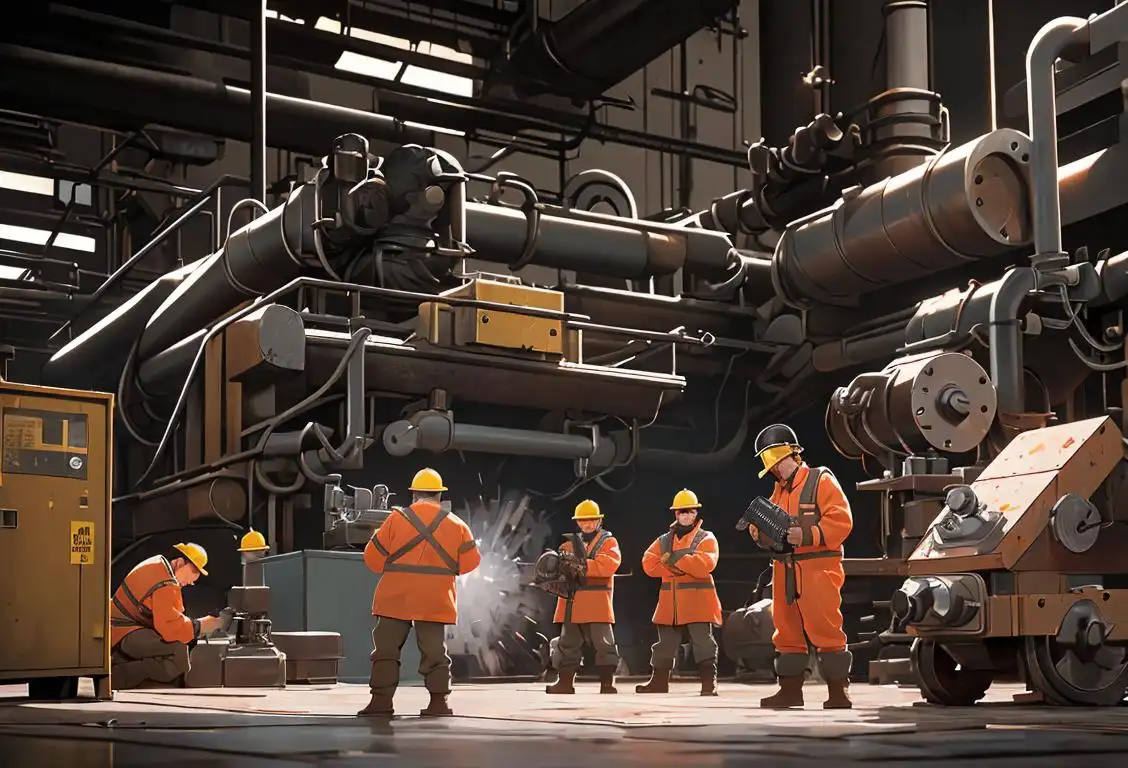National Industrial Day

Welcome to National Industrial Day, where we celebrate the incredible achievements of industries all around the world! Get ready to dive into the fascinating world of innovation, hard work, and some seriously cool machinery. Whether you're a lover of all things mechanical or you simply appreciate the fruits of industrial labor, this day is for you!
When is Industrial Day?
It's national industrial day on the 31st August.
The Birth of Industrial Day
On this special day, we pay tribute to the advancements in industry that have revolutionized our lives. From manufacturing and technology to transportation and construction, industries play a vital role in shaping our society. The roots of National Industrial Day can be traced back to the Industrial Revolution, a period of great change and innovation that took place in the late 18th and early 19th centuries. This revolution brought about the transformation from manual labor to machine-powered production, paving the way for the industrialization of nations.
Since then, industries have evolved and expanded exponentially, creating countless job opportunities, improving standards of living, and driving economic growth. From assembly lines to factories, the impact of industries can be felt in every aspect of our daily lives. National Industrial Day serves as a reminder of the progress we've made and a celebration of the men and women who work tirelessly to keep our industries thriving.
How to Celebrate
There are many ways to honor National Industrial Day and show your appreciation for industries. Here are a few ideas:
- Visit a local factory or manufacturing facility and take a guided tour to learn about the production processes involved in creating various products.
- Support local businesses by shopping for goods that are proudly made in your country or region.
- Take a moment to thank an industrial worker in your life. They might be a family member, friend, or neighbor who puts in long hours to keep the engines of industry running smoothly.
- Research the history of industries in your area. You'd be surprised at how many fascinating stories and innovations you'll discover!
Did You Know?
Did you know that the world's largest industrial hub is located in Guangdong, China? The Pearl River Delta, often referred to as the "Factory of the World," is home to millions of factories producing a wide range of goods.
History behind the term 'Industrial'
1760
The Birth of the Industrial Revolution
The term 'industrial' finds its origins in the Industrial Revolution, which started around the mid-18th century in Britain. This period marked a shift from manual labor to machine-based manufacturing and mechanized production methods. The term 'industrial' was used to describe this emerging system of large-scale production and factory-based industry.
1833
The Factory Act of 1833
In 1833, the British Parliament passed the Factory Act, aiming to regulate working conditions and address the issues faced by workers in the newly established industrial factories. The term 'industrial' gained significance in this period, representing the growing industrialization and the large-scale employment of workers in factory settings.
1844
The Coined Term 'Industrialization'
The term 'industrialization' was coined in 1844 by the French economist Pierre-Samuel du Pont de Nemours. It referred to the process of transforming an agrarian society into an industrial one, wherein manufacturing and technology played a crucial role in economic development. 'Industrial' became an adjective to describe this transformative process.
1875
German Sociologist Ferdinand Tönnies
In 1875, Ferdinand Tönnies, a German sociologist and philosopher, introduced the concept of 'Gemeinschaft' and 'Gesellschaft.' These terms referred to traditional, rural-based communities ('Gemeinschaft') and modern, urban societies characterized by industrialization ('Gesellschaft'). 'Industrial' became associated with the sociological and cultural impact of urbanization and the rise of industrial societies.
20th century
Industrial Design and Art Movements
During the 20th century, the term 'industrial' gained new dimensions in the context of design and art. The movement of 'industrial design' emerged, emphasizing the aesthetic and functional aspects of mass-produced consumer goods. Artists like Andy Warhol and Roy Lichtenstein became known for incorporating industrial imagery in their art, reflecting the influence of industrial culture on artistic expressions.
Did you know?
Did you know that the world's largest industrial hub is located in Guangdong, China? The Pearl River Delta, often referred to as the "Factory of the World," is home to millions of factories producing a wide range of goods.Tagged
awareness funFirst identified
2nd March 2017Most mentioned on
31st August 2019Total mentions
32Other days
Nurses Day
Former Prisoner Of War Recognition Day
Press Day
Handloom Day
Heroes Day
Memorial Day
Dance Day
Bestfriends Day
Liberation Day
Love Your Pet Day









